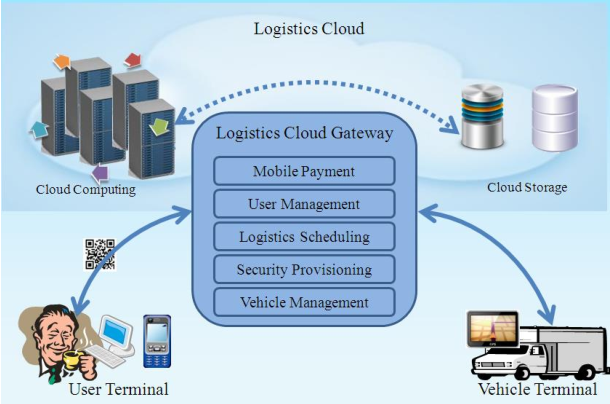
Wrapping up our technology series we're going to take a look at cloud computing and how it integrates all the supply chain technologies we've been discussing. Cloud computing has been around for a while but growing in popularity and integration. All data will eventually reside in the cloud. Let’s be sure we understand what the cloud is. The cloud refers to software and services that run on the Internet, instead of locally on your computer. Most cloud services can be accessed through a Web browser like Firefox or Google Chrome, and some companies offer dedicated mobile apps. No longer will you load programs on your computer from a CD. The advantage of the cloud is that you can access your information on any device with an Internet connection. It’s what allows you to make edits to various files on your home computer, and then continue where you left off from the office or wherever. The cloud also makes collaboration on the same document possible among several viewers.
Next Gen Supply Chain and the Cloud
Of all the NextGen supply chain technologies, the cloud will be integral. Blockchain, IOT, AI and the digital supply chain will all require cloud computing. In fact some say that the cloud will be the most impactful NextGen technology in the supply chain for the foreseeable future based entirely on its use as a backbone of data interchanges. Industry analysts suggest Amazon’s newfound profitability and efficiency to the effectiveness of its cloud services. In the supply chain application, basically, the cloud centralizes data and offers multiple entities access to that data, decreasing costs and speeding supply chain velocity while adding data security. As with any shared data system, there are security concerns to address. That's where our blockchain technology is implemented. We add is some Internet of Things technology in case we want to share data with other machines and some Artificial Intelligence to teach the machines how to execute their operations more efficiently each time. There is another fundamental shift in the supply chain, and elsewhere for that matter, fueling cloud adoption. Quite simply, companies are starting to treat data as an asset. Furthermore, the value of data only increases as it is accessible across enterprises. As the value of that data increases the responsibility of Transportation companies will increase as we will be among those sharing the data. Logistics professionals will need to reinforce their internal data security network to ensure data integrity or face possibly significant financial liability. While most will agree that we aren’t there yet, the direction is clear. Look to the cloud.
Integration Means Advantage
Companies that take advantage of the latest technology and trends made possible by the cloud will be better positioned to adopt newer technologies that are on the horizon. By staying on the leading edge of technology adoption, you'll level the playing field with larger competitors and be poised for success moving into 2018. This is as true with Logistics companies as with any other service provider. Make the commitment this year to be ready to implement these technologies in 2018. You won't need them all. For more information subscribe to our blog or contact us today at www.land-link.com.



 Land-Link, a well respected professional organization, has been providing its clients with effective transportation and logistics solutions since 1978.
Land-Link, a well respected professional organization, has been providing its clients with effective transportation and logistics solutions since 1978.

